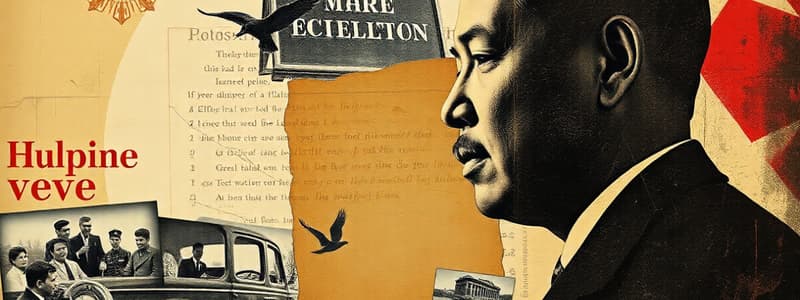Podcast
Questions and Answers
Match the following figures with their primary stance related to the Philippine Revolution of 1896:
Match the following figures with their primary stance related to the Philippine Revolution of 1896:
José Rizal = Advocate for education and reform Andres Bonifacio = Supported armed resistance Renato Constantino = Critic of Rizal's stance Pio Valenzuela = Testified about Rizal's views in prison
Match the following concepts with their definitions based on the lesson:
Match the following concepts with their definitions based on the lesson:
Reform = Gradual change through education and legislation Revolution = Overthrow of a government using force Ilustrado = Educated mestizos advocating for reforms Masses = Common people supporting revolutionary actions
Match the following key ideas with their associated historical context:
Match the following key ideas with their associated historical context:
Rizal's manifesto = Expressed caution against armed struggle 1896 Revolution = Masa's uprising for independence Constantino's thesis = Rizal as a limited hero Filipino nationalism = Desire for an independent nation
Match the following terms with their related topics from the lesson:
Match the following terms with their related topics from the lesson:
Signup and view all the answers
Match the following phrases with their correct implications based on Rizal's views:
Match the following phrases with their correct implications based on Rizal's views:
Signup and view all the answers
Match the following authors with their works or contributions to the study of Rizal and the Revolution:
Match the following authors with their works or contributions to the study of Rizal and the Revolution:
Signup and view all the answers
Match the following ideas with their origins or proponents:
Match the following ideas with their origins or proponents:
Signup and view all the answers
Match the following historical events with their significance to Rizal and Bonifacio:
Match the following historical events with their significance to Rizal and Bonifacio:
Signup and view all the answers
Match the following significant events in Rizal's life with their descriptions:
Match the following significant events in Rizal's life with their descriptions:
Signup and view all the answers
Match the following letters to their recipients:
Match the following letters to their recipients:
Signup and view all the answers
Match the following figures in Rizal's life with their significance:
Match the following figures in Rizal's life with their significance:
Signup and view all the answers
Match the following works of Rizal with their themes:
Match the following works of Rizal with their themes:
Signup and view all the answers
Match the following terms related to Rizal's philosophy with their definitions:
Match the following terms related to Rizal's philosophy with their definitions:
Signup and view all the answers
Match the events leading up to the Philippine Revolution of 1896 with their outcomes:
Match the events leading up to the Philippine Revolution of 1896 with their outcomes:
Signup and view all the answers
Match the following individuals with their corresponding actions or beliefs regarding Rizal:
Match the following individuals with their corresponding actions or beliefs regarding Rizal:
Signup and view all the answers
Match the following dates with their corresponding events:
Match the following dates with their corresponding events:
Signup and view all the answers
Match the following events with their associated implications for Rizal:
Match the following events with their associated implications for Rizal:
Signup and view all the answers
Match the following concepts described by Rizal with their definitions:
Match the following concepts described by Rizal with their definitions:
Signup and view all the answers
Match the following locations related to Rizal's life with their significance:
Match the following locations related to Rizal's life with their significance:
Signup and view all the answers
Match the following key concepts with their relevant explanations in relation to Rizal:
Match the following key concepts with their relevant explanations in relation to Rizal:
Signup and view all the answers
Match the following aspects of Rizal's writings with their elements:
Match the following aspects of Rizal's writings with their elements:
Signup and view all the answers
Match these aspects of the revolution with their corresponding critiques from Rizal:
Match these aspects of the revolution with their corresponding critiques from Rizal:
Signup and view all the answers
Match the following statements about Rizal with their implications:
Match the following statements about Rizal with their implications:
Signup and view all the answers
Match the following historians with their respective observations regarding Rizal:
Match the following historians with their respective observations regarding Rizal:
Signup and view all the answers
Match Rizal's views with the context in which they were expressed:
Match Rizal's views with the context in which they were expressed:
Signup and view all the answers
Match these revolutionary figures to their relationship with Rizal's thoughts:
Match these revolutionary figures to their relationship with Rizal's thoughts:
Signup and view all the answers
Match these phrases with their significance in Rizal's manifesto:
Match these phrases with their significance in Rizal's manifesto:
Signup and view all the answers
Match these terms with their definitions related to Rizal:
Match these terms with their definitions related to Rizal:
Signup and view all the answers
Study Notes
Rizal and the Philippine Revolution of 1896
- Rizal's views on the 1896 Revolution are often misrepresented as opposing revolution, prioritizing reform, and rejecting armed resistance.
- This misinterpretation stems from a false dichotomy between Ilustrados (educated elite) and the masses, and a tendency to portray historical figures as conflicting.
- Rizal and Bonifacio had shared goals, though employing different methods, to establish a Filipino nation.
Rizal's Separatist Stance
-
Historian Renato Constantino criticized Rizal, viewing him as an American-sponsored hero serving colonial interests and neglecting the interests of the Filipino masses.
-
Floro Quibuyen countered by emphasizing the need for careful analysis of Rizal's writings, correspondence, and work to understand his evolving stance.
-
Factors contributing to Rizal's separatist views include:
- Disillusionment with Spain's handling of Filipino aspirations for Hispanization. Example: in a letter to Blumentritt in 1887, Rizal stated the Philippines rather than Spain should seek its assimilation.
- The Calamba Hacienda Case (1887-1889) deepened his concerns about Spanish injustice, leading to increasingly radical views.
- Arrests of Filipinos opposing friars.
- Spanish persecution directly impacting Rizal's family through deportations and property damage. This solidified his conviction to return and fight for the Philippines.
-
In a letter to Mariano Ponce (July 1890), Rizal expressed his intention to return to the Philippines "and let God say what is to happen."
Rizal's Ambivalence Towards Revolution
- Rizal aspired to independence, using reform as a means, as seen in his proposed constitution for La Liga Filipina in 1892.
- Rizal is described as a "reluctant revolutionary" by Historian Teodoro Agoncillo
- Key concerns:
- Widespread Filipino education and development of national consciousness through liberty and education are priorities for Rizal.
- The importance of self-improvement and righteous behavior in Filipinos is essential before a revolution.
- Rizal was apprehensive about an armed revolution, fearing the potential for bloodshed and the possibility of new local tyrants replacing the colonizers.
- Rizal drew from Social Darwinism, suggesting a peaceful path to freedom through evolution.
Rizal and the Katipunan
- Rizal, according to Pio Valenzuela's 1896 statements, was against armed resistance(also as originally stated).
- A later statement Valenzuela added in his 1914 memoir, however, recounted Rizal's support of the Revolution if certain conditions were met, as long as the movement was led by suitable individuals.
- While the 1914 memoir is questioned, other historical evidence doesn't offer details of a direct clash between Rizal and Bonifacio in the Philippines.
Rizal's Public Statement and the Revolution
- Rizal's December 1898 manifesto, intended to clear his name, did not advocate support for revolution, but instead for a more opportune time and method to achieve independence without bloodshed.
- Judge Advocate General's claim: Rizal recognized that the revolution was "premature" and not likely successful at the time. He suggested a less-violent approach for the future and suggested that Filipinos improve themselves.
The Popular Perception of Rizal
- The general Filipino populace, largely unaware of Rizal's specific views, understood him as a martyr and inspiration for resistance.
- Rizal's words became "rallying cries" interpreted as messages of salvation and resurrection.
- The image of Rizal being perceived as the Tagalog Christ. Rizal's death served as a re-enactment of the Passion of Christ.
Studying That Suits You
Use AI to generate personalized quizzes and flashcards to suit your learning preferences.
Description
This quiz explores the complex views of José Rizal regarding the Philippine Revolution of 1896. It delves into the misconceptions about Rizal's stance on revolution, his relationship with figures like Bonifacio, and critiques from historians about his legacy. Engage with key historical contexts and debates surrounding Rizal's contributions to Filipino nationalism.




